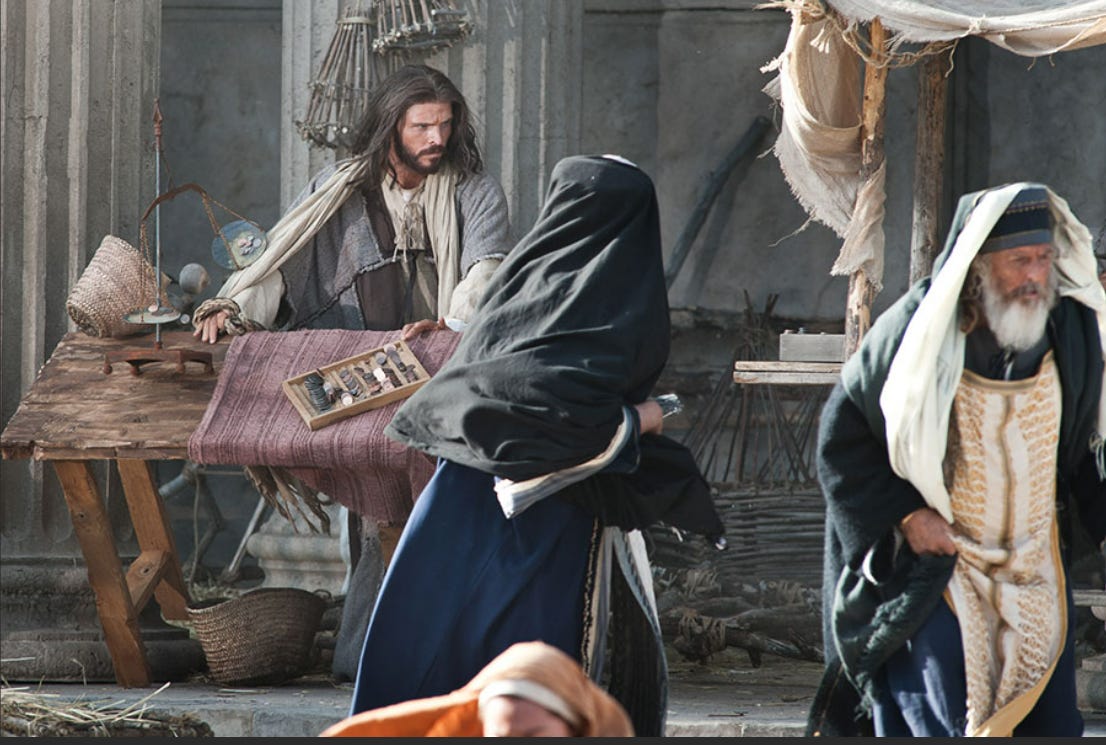It's Holy Monday

However, in order to not clog up your inbox, you will only receive an email on Thursday, and Easter Sunday.
Read "It's Palm Sunday"
“Holy Week is a privileged time when we are called to draw near to Jesus: friendship with him is shown in times of difficulty.”
—Pope Francis—
Holy Monday, also known as “Great and Holy Monday” in Eastern Orthodox Christianity, is a time for sincere believers to reflect on the themes of repentance, prayer, and preparation for the celebration of Easter. In various traditions, Holy Monday is marked by special church services, fasting, and other spiritual disciplines. In some traditions, three stories from Mark 11 become the focus of reflection and prayer.
Jesus curses the fig tree
12 The next day, after leaving Bethany, Jesus was hungry. 13 From far away, he noticed a fig tree in leaf, so he went to see if he could find anything on it. When he came to it, he found nothing except leaves, since it wasn’t the season for figs. 14 So he said to it, “No one will ever again eat your fruit!” His disciples heard this. (Mark 11:12-14, CEB)
This “acted-out parable” of Jesus is curious. Mark paints us a picture of a healthy tree full of leaves. From a distance, the tree looks good, but up close, it becomes clear that there is no fruit. Before producing good fruit, a fig tree should produce tasteless green fruit. If a tree has green leaves but none of the pre-season fruit, the tree would likely not produce any fruit that year.
Jesus seems to be making a prophetic statement about the fruitless religious establishment that looked good from a distance but was revealed to be wholly fruitless when seen up close. We could also make a personal application for our situation today —
Does the person I look like from a distance match who I am when up close and personal?
Does my walk match my talk?
In other words, does my Christian life reflect humility, integrity, and authenticity?

Jesus causes a scene in the temple
15 They came into Jerusalem. After entering the temple, he threw out those who were selling and buying there. He pushed over the tables used for currency exchange and the chairs of those who sold doves. 16 He didn’t allow anyone to carry anything through the temple. 17 He taught them, “Hasn’t it been written, My house will be called a house of prayer for all nations? But you’ve turned it into a hideout for crooks.” 18 The chief priests and legal experts heard this and tried to find a way to destroy him. They regarded him as dangerous because the whole crowd was enthralled at his teaching. 19 When it was evening, Jesus and his disciples went outside the city.
(Mark 11:15-19, CEB)
Following the triumphant scene of the previous day, the narrative begins to change. Jesus aggressively challenges the goings-on in the temple, and some among the religious authorities start looking for a way to do away with the pesky Jesus.
What, you might be asking, made Jesus so upset?
When he enters the temple, Jesus finds people buying and selling inside the temple courts, activities that could have just as easily taken place outside the temple grounds. The Passover provided ideal profit-making opportunities, making doves and other unblemished livestock available for those who had traveled far.
The problem, it seems, was that all of this buying and selling was likely taking place in the Court of Gentiles — the designated area in the temple where Gentiles could enter into the “prayer for the nations” (11:17). It is important to notice that Jesus does not expel the Gentiles or the Romans from the temple. Instead, he criticizes the temple authorities (his own people) for not making space for foreigners to worship.
In other words, what is happening in the course of temple worship is not in line with the temple's purpose. And Jesus isn’t happy about it.
We, too, must be careful not to fill our temples (our literal places of worship or our figurative bodily temples) with attitudes, words, and actions that are not in line with Christ's purpose. As importantly, we cannot exclude from our Christian lives—privately or corporately—anyone who comes into the outer courts seeking to find a place to belong.

Have faith, pray, and forgive
20 Early in the morning, as Jesus and his disciples were walking along, they saw the fig tree withered from the root up. 21 Peter remembered and said to Jesus, “Rabbi, look how the fig tree you cursed has dried up.”
22 Jesus responded to them, “Have faith in God! 23 I assure you that whoever says to this mountain, ‘Be lifted up and thrown into the sea’—and doesn’t waver but believes that what is said will really happen—it will happen. 24 Therefore I say to you, whatever you pray and ask for, believe that you will receive it, and it will be so for you. 25 And whenever you stand up to pray, if you have something against anyone, forgive so that your Father in heaven may forgive you your wrongdoings.”
(Mark 11:20-25, CEB)
Jesus and the disciples pass by the previously cursed fig tree, finding it wholly withered. Peter points the tree out to Jesus, and in the following few verses, Jesus gives two of his most difficult-to-understand teachings.
…whoever says to this mountain, ‘Be lifted up and thrown into the sea’—and doesn’t waver but believes that what is said will really happen—it will happen.
Some very smart people who study such things believe that this statement from Jesus alludes to the temple on the Temple Mount. Such a statement from Jesus would have continued to flip people’s expectations on their heads—rather than the temple being exalted in the new kingdom, it would be cast down into the sea, so to speak.
The mountain Jesus mentioned could also symbolize the obstacles and challenges we face in our lives, particularly those that seem insurmountable. In this scenario, Jesus suggests that nothing is beyond possible for the one who trusts fully in God. No obstacle is insurmountable.
….whatever you pray and ask for, believe that you will receive it, and it will be so for you…forgive so that your Father in heaven may forgive you…
Taken by itself, out of context, this statement seems like a magical formula for getting anything one might desire. That is NOT what Jesus is teaching! Later in Mark’s gospel, as Jesus is praying in Gethsemane, any notion that asking in prayer always results in receiving what we ask for is quickly disposed of.
“Take the cup from me,” Jesus prayed (Mark 14:35-36).
The cup was not taken away.
Prayer is not a tool of manipulation.
The starting point of prayer, however, is connected to forgiveness.
My forgiveness of the people in my sphere of life.
Somehow, in the economy of God, my willingness to forgive is somehow intertwined with God’s willingness to forgive me. And so, this Holy Week, let us forgive. As we reflect on the forgiveness of God offered to us in and through Christ, let us also be a people of uncommon, unusual, and undeserved forgiveness.
“He will provide the way and the means, such as you could never have imagined. Leave it all to Him, let go of yourself. Lose yourself on the Cross, and you will find yourself entirely.”
—St. Catherine of Siena—
Would you do me a favor?
If you are reading this online, please scroll down to the bottom of this email and leave a comment under "Member Discussions."
NOTE: If this is your first time to leave a comment, you may need to sign in first. Just enter your email and then check your email for a personalized link. You should only have to do this once (unless you log back out when you're done).
If this is your first time to leave a comment, you may need to sign in first. Just enter your email and then check your email for a personalized link. You should only have to do this once (unless you log back out when you're done).





Member discussion